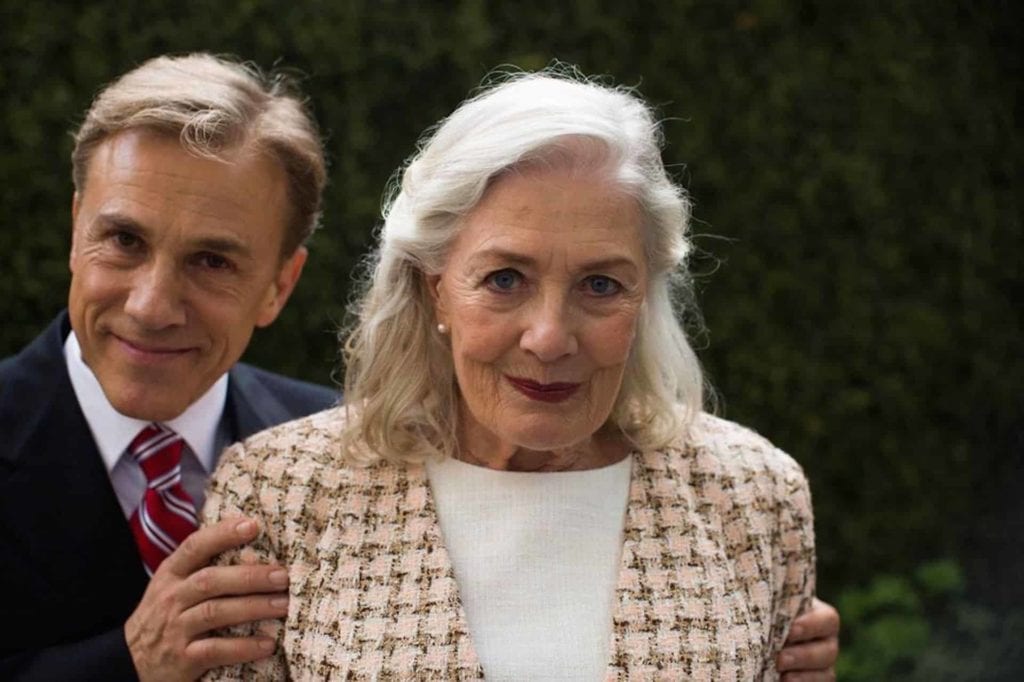‘Georgetown,’ a Film About Murder. Or Is It?
By • May 20, 2021 2 26313

It happened in Georgetown. In August of 2011. A murder and investigation that verged on the “you can’t make this stuff up” category. Now a fictionalized movie about the bizarre case has been released this week in theaters (locally at Union Market) and on streaming TV, “Georgetown” stars three award-winnning actors: Christoph Waltz, Vanessa Redgrave and Annette Bening.
Some critics say it doesn’t dramatize the murder enough; others say it is too much about Georgetown’s unique social life. But to Georgetown reporters who watched the film with some locals who knew the couple, the film was mesmerizing and familiar. Still, the film shows no real Georgetown sights, as it was produced in Toronto.
Using a number of flashbacks, “Georgetown” covers the life and eventual murder of 91-year old socialite Viola Herms Drath – albeit in fictional form, with names changed. After the death of her longtime husband, she married and lived with her new husband Albrecht Gero Muth, who was 44 years her junior. Their home at 3206 Q St. NW had become a place of frequent social events after she and Muth created the “Eminent Persons Group,” a diplomatic behind-the-scenes NGO.
Although born in Germany, Muth claimed to be a general in a clandestine Iraqi military organization with close contacts with movers and shakers in the Middle East. He was often seen in Georgetown wearing an Iraqi Army uniform and beret – along with medals – at dinners and conferences of the EPG. The couple became renowned for such parties.
But it was all made up. The Georgetown social scene revelation aspects of the movie depict how the couple would lure an influential senator or government official to attend an intimate dinner at their home with another VIP – often an ambassador or such. The first contact might be made by weaseling into a private reception with one of the targets and pretending to have a personal mutual friend, and get them to accept a dinner invitation. Then using that acquisition, they would lure the other target VIPs. Private dinner parties and small conferences led to contacts for more in what some of the movie’s critics called “typical Georgetown social life” of lobbyists, politicians and ne’er-do-wells.
But the movie was more personal for others. Several remember Drath as a former reporter for Handelsblatt, a German newspaper and as a columnist for the Washington Times. She wrote several books and was actively involved in foreign policy, particularly affairs involving relations between Germany and the U.S. She was married to a former U.S. colonel with whom after retirement they shared an active social and cultural life in Georgetown and Washington, D.C.
“My mother was a good friend of Viola,” remarked Nicole D’Amecourt after watching the film. “The couple often came to many of my mother’s social events. I liked Viola. She was ten years younger than my mother, and she always dressed very elegantly, very sharp. I found Muth to be creepy but had no idea he was so dangerous.”
The couple’s social schemes started to fall apart once some in the know exposed Muth as a fake. They broke up for awhile, amid domestic abuse and when Muth took a gay lover, much to the relief of her daughters. But Drath eventually let him back in her life. On the night of Aug. 11, 2011, she was found strangled and beaten in her bedroom by Muth after he returned from a post dinner-party midnight walk. The film does not go into visual detail of the murder. But it does detail his many machinations to avoid being convicted for her murder after being arrested.
Many of his antics were frankly amusing to watch in the film, especially the ones he used to continually flummox his own lawyers. They included bizarre excuses and faux alibis that his defense team struggled to explain only to be eventually fired by Muth for not being successful. He took up his own defense even as he started a hunger strike and was hospitalized. He became the first murder defendant in D.C. to be held in trial on a video.
In an almost anticlimax to the film, “Georgetown” notes at the end that Muth was sentenced to 50 years in prison on Jan 6, 2016.


This movie is not about murder. It’s a shocking reminder that we are now living in a country where the most unbelievable, fantastic lies are believed and the fool who tells them can destabilize world peace. This is much more dangerous than one murder, although tragic. I was surprised it was a true story just as I am surprised every day when I listen to the news. It is ironic that this happened in 2016, the year that broke my heart. I do not agree with the film critic who says Christopher Waltz should have played the protagonist more menacingly. He made the artistic decision to play him as a laughable idiot, as an odd fool, a frequent character seen in American politics these days. Had Waltz been more violent and frightening it would have made a more entertaining murder film. Instead I had an odd sick feeling in the pit of my stomach. Truth is clearly stranger than fiction. And, the mark of good acting is getting at the truth.
I agree with you
I was really shocked that this was based on a true story
And also that Elsa contributed to this
Waltz played this very impressively
When he was telling his wife about his activities it seemed authentic
– so if he believed it
Interesting and disturbing